| Reviews & Columns |
|
Reviews DVD TV on DVD Blu-ray 4K UHD International DVDs In Theaters Reviews by Studio Video Games Features Collector Series DVDs Easter Egg Database Interviews DVD Talk Radio Feature Articles Columns Anime Talk DVD Savant Horror DVDs The M.O.D. Squad Art House HD Talk Silent DVD
|
DVD Talk Forum |
|
|
| Resources |
|
DVD Price Search Customer Service #'s RCE Info Links |
|
Columns
|
|
|
Juggler, The
"'Home' is a place you lose."
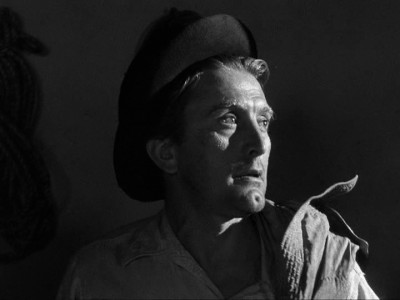
If the premise of Edward Dmytryk's The Juggler--Kirk Douglas is a German Jew, formerly a famous entertainer, now relocating to the newly created nation of Israel after surviving World War II--sounds a bit iffy, its execution is for the most part thoughtfully handled and careful to avoid going over the top. That is not to say that the film, now finally available to home viewers from Sony/Columbia's vaults through its manufactured-on-demand DVD catalog, is not obviously a studio product of its time; it plays very fast and loose with all of its historical and political themes, hewing close to the basic narrative requirements (conflict, redemption, love story) and steering well clear of too much deep or sustained thought on the thorny events it seems almost incidentally to be raising (the Holocaust and the formation of Israel, for two examples that have often provoked reflection), so if you are looking for realism in the form of socio-historical accuracy or nuanced geopolitical considerations, you will be out of luck. Enjoying The Juggler will largely depend on how forgiving one is of these built-in lacunae in Hollywood's standard approaches to storytelling in that era (the picture was released in 1953), balanced with one's level of appreciation for how remarkably high the major studios' standards of quality for every facet of production were once upon a time, even for a half-forgotten star vehicle.
The film opens on a montage of refugees--European Jews who survived World War II--arriving, in 1949, to their Promised Land, the just-created state of Israel. Among these is Hans Muller (Douglas), a troubled former clown/juggler/all-purpose entertainer and beloved star of the European stage, who has lost his wife and children in the war, and whose wrist bears that horrendous numerical tattoo with which the Nazis forcibly consigned so many of their fellow human beings to the status of anonymous, disposable cattle. Muller, after being taken to a refugee camp with his friend Willy (Oskar Karlweis) and asked what his skills are, wonders what place there could be for a juggler in a nation struggling to establish itself, where basics like food, plumbing, and electricity are more urgent concerns than culture. Willy, less concerned by Hans's unemployability than by shis clearly troubled mental state (manifest in behavior like his refusal to go below deck on the boat trip to Israel, and his tearful insistence to a woman he glimpses upon his arrival that she is his dead wife, and her children his dead children) has a psychologist he meets in the camp approach Willy, an encounter that reveals the film's central conflict: Hans, like anyone persecuted under the Nazi regime, has had his life and his mind badly damaged by the experience and suffers from what we now characterize as post-traumatic stress disorder and survival guilt, yet he is proud and defensive, unable to admit that he is disturbed and needs help. He breaks out the amusing routines of his vocation as a distraction from and cover for his psychological wounds as well as his creeping cynicism and paranoia.
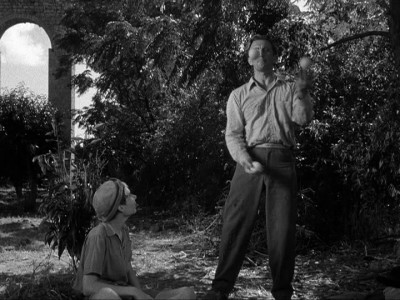
To Hans's mind, there can be no such thing as a home where he can feel safe and secure, and all authority figures, including the doctor and Israeli policemen, are latent "Nazis." His unaddressed mental instability jeopardizes his freedom when, after running away from the camp to Haifa in order to avoid further psychological probing, he feels cornered by a police officer and violently lashes out. Believing he has killed the officer, he flees, becoming the object of a nationwide search, with his picture in the newspapers accompanying notifications that he is a wanted criminal. On what he believes is his journey out of Israel and away from any threats of "home" or "treatment" (let alone imprisonment), he meets an orphaned boy, Yehoshua (Joey Walsh), who acts as his guide through the Israeli countryside. Though Hans conceals his real identity and the extent of his prior celebrity from Yehoshua, he amuses him by showing him some of his tricks, and the boy eventually aspires to follow in Hans's footsteps and become the "first Israeli juggler."
Hans also meets and falls in love with a young woman, Ya'El (Milly Vitale), who nurses him to health after he and Yehoshua, for whom he has come to feel responsible, barely escape a minefield bordering the kibbutz (Jewish cooperative farm and village) she works on. Will his burgeoning attachment to Yehoshua and Ya'El, both of whom are strong, hopeful citizens of their newly formed homeland, be enough to convince him that--even after revealing who he really is, all his losses and weaknesses and damage--Israel could be a community and a home for him, too?
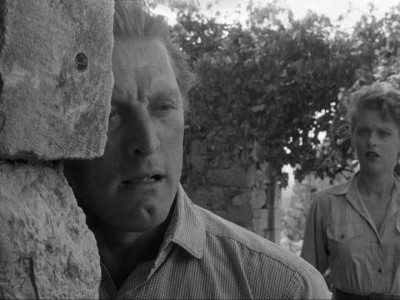
Dmytryk and cinematographer J. Roy Hunt (who also worked with Dmytryk on his 1947 noir Crossfire and was DP for Jacques Tourneur on the great I Walked with a Zombie) shot The Juggler on location in and around Haifa, Israel, and the melodramatics of the story, rather than clashing with the "authentic" environment, are actually well-integrated with and complemented by the real locations, which have all the richness--especially in the exterior shots, with their gorgeous landscapes and contrasts of sunlight and shade--of the storied "glorious black and white" of studio filmmaking's heyday. Dmytryk's skills as a director of suspense are readily apparent in the chase scene through Haifa, and he approaches the bits with Douglas in charming, clowning, child-delighting entertainer mode with a restraint and naturalness that keep any hamminess to a minimum.
The story's spots of conventionalism are nonetheless not entirely ameliorated by all the technical artistry on display. Douglas and Vitale have chemistry, and there is an old-fashioned pleasure to be had in their falling-in-love scenes, swooningly accompanied by George Antheil's score. They acquit themselves well, performance-wise; theirs is the kind of pre-Method acting that relies on charisma, confidence, and persuasive personality--the things "star power" used to mean--and it is easy to see why Douglas, in particular, became such a legendary star. There is nothing embarrassing about these flights of romance or the fact that they are (well) executed in a heightened mode that is not strictly realistic. But it is something we have seen so many times, as is the possibility of redemption through a pure, clear-eyed child, reiterated here in Hans's friendship with Yehoshua. The story and narrative elements of Michael Blankfort's script (based on his novel) seem, particularly to contemporary eyes, to neglect obvious areas of unmined urgency, rich in cinematic possibilities, just so that we can be sure to have the requisite love interest and cute kid, however well the director, cast, and crew live up to the challenge of breathing life into the conventions.
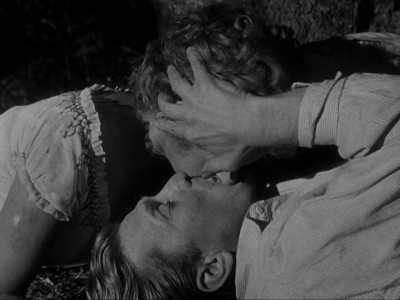
A recurrent shifting of emphasis away from anything that might take the film deeper into all the interesting, troubling things it brings up is The Juggler's principal weakness. It feels at once thematically overstuffed and underdeveloped; it even manages, on an allegorical level, to glancingly hit on, and thereafter abandon, the McCarthyist "Red scare" and blacklisting of the times when an Israeli police investigator tells a refugee child, who does not want to inform on Hans Muller, that "Sometimes, for the sake of the law, we have to give up our friends." The film's overreaching and lack of follow-through is likely due at least in part to tentativeness resulting from its historical nearness to, and consequent lack of perspective on, the Second World War, the Holocaust, the recognition of the State of Israel, and the United States' degree of involvement in each of those events. Dmytryk is certainly great at lean, propulsive filmmaking, at setting moods and polishing off with flair whatever is to be conveyed in a shot or scene, so there is never a dull or plain moment. But there is something unsatisfying about so much death, loss, emotional devastation, and even optimistic belief and hope conveyed through expository dialogue, however emotionally invested in it the actors are; particularly in light of the very loaded and complex historical situation, some of it comes across as just too simple and tidy. Again, the performances and direction make these moments work as they happen, but considered as a whole, they make the picture seem a bit hurried and incomplete, as if it is missing some important dimension. Despite its many pleasures, The Juggler's full potential seems to have gone somewhat unfulfilled, its depth having been partly sacrificed to the exigencies of storytelling "rules" and commonplaces too rigidly adhered to.
THE DVD:
Despite some occasional flicker and graininess due, presumably, to the age of the source materials, the studio has done quite a respectable job on the transfer, digitally remastering the film from a nicely preserved print and presenting it at its original aspect ration of 1.37:1. There is no trace of the notable inferiority at the visual level that is sometimes experienced as the trade-off for a film's availability when it comes to manufactured-on-demand titles. The image quality of this disc is actually on a par with, to name a near example, Criterion's Ace in the Hole, a black-and-white studio film of the same period, also starring Douglas.
Sound:The monaural soundtrack sounds as good as could reasonably be expected. All dialogue and other diegetic sounds--including, during a celebratory scene, a musical interlude with accordion and many voices--sounds clean and clear, without distortion or tinniness, and everything is always fully audible and balanced well alongside the omnipresent orchestral score, which sounds as pleasingly sharp and clear as the sound technology of the period would allow.
Extras:Though a great many movie-on-demand titles like The Juggler contain no extras whatsoever, this one does contain the film's original theatrical trailer. A typically hyperbolic, fairly uninformative studio trailer of its time, all floridly written titles and exclamation points ("the PERFECT mating of star and story!"), it nevertheless offers a nice point of reference for comparison, as the trailer looks to be in the original condition of a beat-up print (with lots of obvious flicker and print damage) and underscores how much higher a quality standard the film itself has been brought up to for this release.
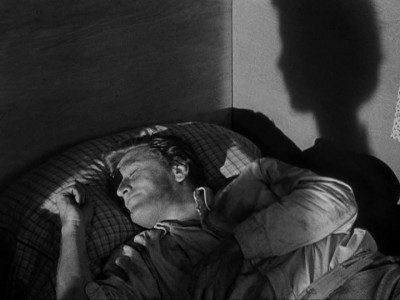
The Juggler is a vibrantly made film, nicely done and very engaging and entertaining. But its potential fineness is diminished by some basic weaknesses of conception and narrative that render the film ultimately feeling thin, lessened somehow, and not entirely up to some of the many (too many) challenges it sets for itself. A less wide-ranging group of thematic concerns, or a deeper, more detailed and thoroughgoing approach, might possibly have made the film a more unqualified success. As it stands, though, it is still a treat to watch talents like Dmytryk and Douglas in action, and the film can in good conscience be Recommended, particularly for fans of either of those two cinema heavyweights or of the artistry that used to be standard for Hollywood moviemaking, which this film is a nice mid-level reminder of.
|
| Popular Reviews |
| Sponsored Links |
|
|
| Sponsored Links |
|
|
| Release List | Reviews | Shop | Newsletter | Forum | DVD Giveaways | Blu-Ray | Advertise |
|
Copyright 2024 DVDTalk.com All Rights Reserved. Legal Info, Privacy Policy, Terms of Use,
Manage Preferences,
Your Privacy Choices | |||||||














